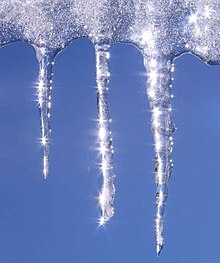
Back تجمد Arabic Solidificación AST Pagyelo BCL Втвърдяване Bulgarian হিমন Bengali/Bangla Solidificació Catalan بەستن CKB Tuhnutí Czech Erstarren German Πήξη Greek

Freezing is a phase transition where a liquid turns into a solid when its temperature is lowered below its freezing point. In accordance with the internationally established definition, freezing means the solidification phase change of a liquid or the liquid content of a substance, usually due to cooling.[1][2]
For most substances, the melting and freezing points are the same temperature; however, certain substances possess differing solid-liquid transition temperatures. For example, agar displays a hysteresis in its melting point and freezing point. It melts at 85 °C (185 °F) and solidifies from 32 °C to 40 °C (89.6 °F to 104 °F).[3]
- ^ "freezing". International Dictionary of Refrigeration. Archived from the original on 2019-10-01. Retrieved 2022-11-03.
- ^ "freezing". ASHRAE Terminology. Retrieved 2022-11-03. — via https://www.ashrae.org/technical-resources/free-resources/ashrae-terminology
- ^ "All About Agar". Sciencebuddies.org. Archived from the original on 2011-06-03. Retrieved 2011-04-27.
© MMXXIII Rich X Search. We shall prevail. All rights reserved. Rich X Search